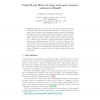34 search results - page 1 / 7 » Efficient Strictness Analysis of Haskell |
94
Voted
SAS
1994
Springer
15 years 6 months ago
1994
Springer
Strictness analysis has been a living field of investigation since Mycroft's original work in 1980, and is getting increasingly significant with the still wider use of lazy fu...
103
click to vote
ENTCS
2007
15 years 2 months ago
2007
mplate Haskell for Abstract Interpretation Clara Segura1 ,2 Departamento de Sistemas Inform´aticos y Programaci´on Universidad Complutense de Madrid Madrid, Spain Carmen Torrano3...
118
Voted
PEPM
2010
ACM
15 years 11 months ago
2010
ACM
Adapting a strictness analyser to have it take into account explicit strictness annotations can be a tricky business. Straightforward extensions of analyses based on relevance typ...
158
Voted
SAS
1994
Springer
15 years 6 months ago
1994
Springer
Amtoft has formulated an "on-line" constraint normalization method for solving a strictness inference problem inspired by Wright. From the syntactic form of the normaliz...
257
Voted
PADL
2009
Springer
16 years 2 months ago
2009
Springer
Analysis of biological data often involves large data sets and computationally expensive algorithms. Databases of biological data continue to grow, leading to an increasing demand ...

